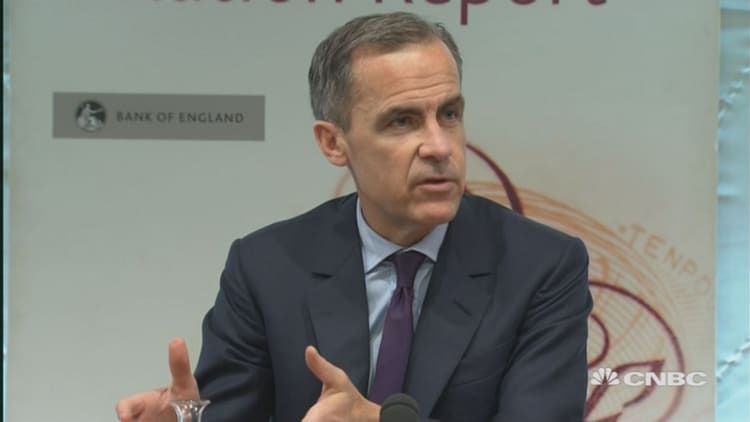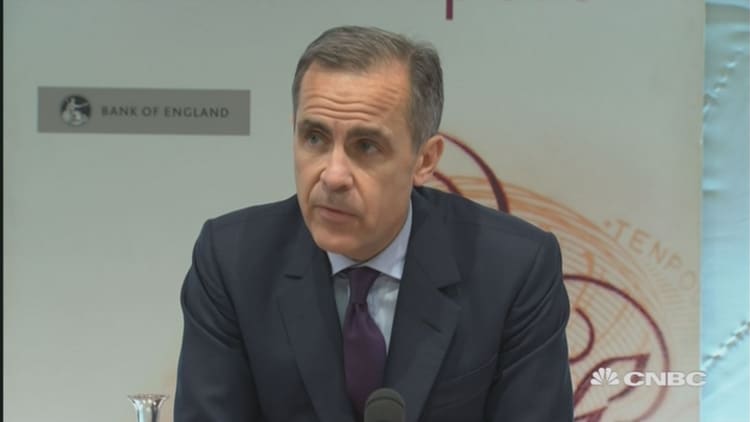




The Bank of England kept interest rates on hold at record lows again on Thursday in a unanimous decision, cutting its economic growth outlook amid growing concerns of a slowdown in the global economy.
All nine rate-setters on the Monetary Policy Committee (MPC) voted for no change, marking a more dovish decision than last month's 8-1 vote. The last time the committee voted unanimously was July 2015.
The Bank's rate has been at the record low of 0.5 percent since March 2009.
Subdued U.K. wage growth and concerns about international markets pushed the BoE to unanimously vote to hold rates, with Ian McCafferty, the Monetary Policy Committee's lone hawk, falling back in with the flock of doves.
The central bank forecast U.K. economy would grow by 2.2 percent this year and 2.3 percent in 2017, down from a forecast of 2.5 percent and 2.6 percent in November.
"Global financial conditions have deteriorated notably," Carney said a press conference following the rate decision, referencing the "widespread falls" in global equities and the widening of credit spreads.
Oil price hits inflation outlook
The MPC now expects the Consumer Price Index (CPI) rate to remain below 1 percent for the rest of the year. This outlook for weaker-than-expected inflation in the last report in November is due mainly to lower oil prices. The committee believes these will depress energy inflation for longer.
"Since our November report, oil is down by another third. In the near term, risks of inflation remain to the downside. We will do the right thing at the right time on rates," Carney said.
In his letter to the Chancellor explaining why inflation was again below target, Governor Mark Carney pointed to the volatility in risky assets and weaker Chinese and emerging market growth.
In voting for no change, it was noted in the inflation report that market rate forecasts are now pointing to lift off later than expected in 2018. However, the flatness of the yield curve makes picking a specific month challenging. The market implied rate is now for the bank rate to reach 1.1 percent by the first quarter of 2019.
"Low inflation, recent weakening of wage growth, growing concerns about the global economy and the Brexit risk will keep the dovish BoE on hold until at least November in our view. But this is much earlier than the path currently implied by market indicators," said Kallum Pickering, senior U.K. economist at Berenberg.
Despite pointing to a tighter U.K. labor market, and expressing the view there is now less slack in the economy, the committee observed wage growth and labor costs have been weaker than expected. This has happened even as domestic U.K. household and business sentiment had been robust.
Rates will go up, not down
Carney has been clear in recent weeks that the BoE will not be following other central banks into action, after the U.S. Federal Reserve raised rates for the first time since 2007 before Christmas and the Bank of Japan's slashed rates in to negative territory last week.
There was no mention in the minutes of a discussion on cutting rates rather than lifting them. In fact, the view remains that deflationary pressures will eventually drop out and rates will eventually go up.
He reiterated this stance in the press conference on Thursday, adding that the "whole MPC thinks that the next move in rates is more likely to be up than down."
Sterling traded slightly higher against the dollar on Thursday after Carney dismissed a possible interest rate cut, with the pound trading at $1.4612 against the greenback.




